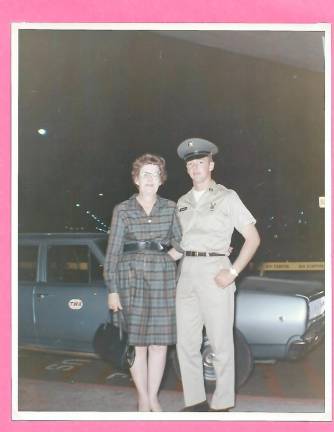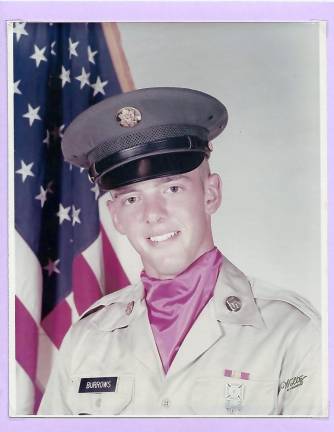Chester's Citizens in the Vietnam War: The Bridge Builder
Chester. Sgt. Daniel H. Burrows of Chester learned how to build bridges, lead a squad, and cope with an ever-present guerilla threat in the heavy jungle heat.


Since time immemorial, bridges have been vital to civilization. We use them to cross rivers, traverse cliffs, and simply make travel quicker.
Their value is especially vital in war, when the speed and efficiency of an army to move troops and supplies can make the difference between victory and disaster. With the advent of modern technology, military engineers were capable of building and repairing structures at unbelievable speeds. The engineers of the U.S. Army found themselves very busy through all of America’s conflicts. Their importance was especially notable during Vietnam, as supply lines were a frequent target of the North Vietnamese Army and its allies. Among the men responsible for building and repairing bridges, as well as other duties, like mine-sweeping, was Sgt. Daniel H. Burrows of Chester.
The Burrows family has a long history in Chester, dating back over a century, with many members serving their country in different capacities. His great-grandparents were very active in the community during World War I. His great-grandfather was the local Scoutmaster, helping with rallies and fundraising for the war effort. After the death of his great-uncle, Daniel S. Burrows, during the battle of the Hindenburg Line, his great-grandmother dedicated all of her effort and resources to helping disabled veterans of the war. Both his grandfather and father were drafted during their respective World Wars. But as butchers, they were exempt for their vital trade.
Jungle warfare
On April 22, 1968, Daniel received his draft notice and was told to report to the military office on Webster Avenue in Goshen. Showing an aptitude for engineering, he was sent to the U.S. Army Engineer School at Fort Leonard Wood in Missouri for specialized training. He was assigned to the 25th Infantry Division, based in Hawaii, which specialized in jungle warfare.
Arriving in the South Vietnamese capital of Saigon, now known as Ho Chi Minh City, Burrows saw firsthand the difference in climate. A thick humidity was the norm, the jungle was wild, and heavy rain fell daily at 3:30 p.m.
Burrows was stationed at the 25th’s HQ, Củ Chi Base Camp northwest of Saigon. Recognized as a capable leader, Burrows was promoted to sergeant and put in charge of a squad of about a dozen men. One of his responsibilities was to oversee that his men were staying alert and focused on guarding the base at night, which they had an unblemished record in doing under him.
Burrows employed a no-nonsense approach, but was fair and respectful to his men. However, not all parts of his tour of duty went as smoothly, with the dangers of the enemy ever-present. The first hour of every morning was spent looking for booby traps set by Vietcong guerillas during the night. To clear large swaths of land, the engineers had two bulldozers drag a massive, heavy chain between them over a field a few times. The engineers would watch in awe as the chain danced in the air after every explosion. Even above the ground, the danger was real, as the helicopter transporters dodged enemy fire and soldiers sat on their helmets for extra protection. During one of his clearing missions, Burrows with his comrades listened to July 20th, 1969, Moon Landing over the radio.
The greatest challenge faced by the 65th was the crucial bridge to the colossal U.S. Army base of Long Binh, located near their camp and under their jurisdiction. After Vietcong guerillas had destroyed the main bridge, which allowed the Americans to quickly cross the Dong Nai River, the 65th was given the mission of rebuilding it as quickly as possible. The necessary materials to build a 725-foot-long bridge was more than was available in the entire region. The army’s response was to have all the materials from across South Vietnam brought to the 65th. Burrows and his unit watched in astonishment as a swarm of helicopters appeared over the horizon and delivered their payloads. Though their task was large, the 65th was solely responsible for building the bridge, which the battalion completed quickly with exemplary skill and a great sense of pride, throwing their lieutenant in the water to celebrate.
Return to Chester
Upon reaching the end of his tour of duty in November, Burrows was sent back to the States. During a layover in Okinawa, he visited his brother, who was a military policeman and responsible for guarding the nerve gas being stored at the Chibana Ammunition Depot. Burrows arrived back in the States on Thanksgiving Day, giving his mother the best kind of surprise. He immediately took a hot bath.
Following his service, Burrows headed out to California, living free with a dune buggy. After a few years he returned to Chester, opened a market, where Beer World Chester is currently located, married, and had two daughters. He used his army training, skills, and abilities to get elected to public office and to become a school bus driver.
He still tells how he warned all the kids on his bus route not to mess with his house on Halloween because he knew their parents. They honored his warning.
A proud veteran, Burrows was a member of the local American Legion, located at that time where the CVS pharmacy is now. He is still active in the community and involved with the Chester Historical Society, keeping a proud family tradition going. Like countless other veterans, Burrows has used the skills and values instilled from his service to serve and contribute to our nation.